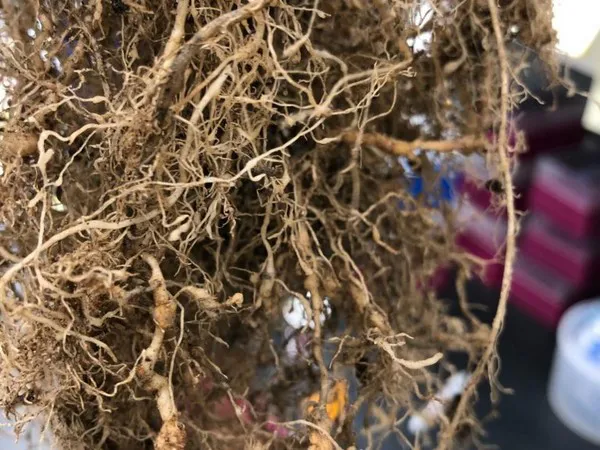Scientists at Cornell University’s Boyce Thompson Institute and UC Davis have found that plants can manipulate the chemical signals of roundworms to keep pests at bay.
Roundworms, or nematodes, cause an estimated $100 billion in crop damage worldwide every year by feeding on plants, especially their roots. The worms secrete a class of compounds called ascarosides into soil that apparently allow them to communicate. Plants can “hear” this signal, because plants activate their immune defenses when they are exposed to ascarosides.

Tomato roots infected with southern root-knot nematodes. Plants can respond to chemical signals from the worms to activate defenses, and also “reply” by giving off worm signals that keep other worms away. Photo by Murli Manohar, BTI
A team led by Frank Schroeder of BTI and Cornell and including Valerie Williamson of the UC Davis Department of Entomology and Nematology has now found that plants can not only listen, but talk back. Studying three species — the lab plant Arabidopsis, wheat and tomato – they found that plants exposed to an ascaroside called ascr#18 could break it down and release it back into the soil. This appears to create a signal that says “Go away, this plant is already full of worms” and repels new worms.
“Go Away” in roundworm
“It’s not only that the plant can ‘sense’ or ‘smell’ a nematode,” Schroeder said in a BTI news release. “It’s that the plant learns a foreign language, and then broadcasts something in that language to spread propaganda that ‘this is a bad place.’ Plants mess with nematodes’ communications system to drive them away.”
Worms may have evolved to hijack plant metabolism to send this signal. Plants, in turn, may have evolved to tamper with the signal to appear as heavily infected as possible, thereby fooling would-be invaders.
“This is a dimension of their relationship that no one has seen before,” said Murli Manohar, a senior research associate at BTI. “And plants may have similar types of chemical communication with other pests.”
The work is published in the journal Nature Communications and the discoveries are being commercialized by a BTI and Cornell University-based startup company, Ascribe Bioscience, as a family of crop protection products named Phytalix.
Source: UC Davis (Andy Fell)
